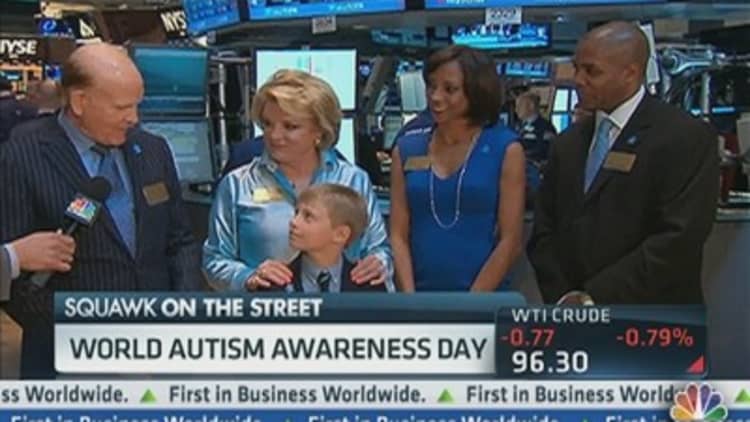The leading autism nonprofit and Google have teamed in an attempt to link private investors like venture capital, private equity and even hedge funds to inject innovative autism-related business development.
Thanks to increased awareness and diagnosis of autism, it's now known that one in every 88 American children is born with some level of the disorder. That's more than those affected by diabetes, AIDS, cancer, cerebral palsy, cystic fibrosis, muscular dystrophy or Down syndrome—combined.
But products and services for autism are woefully inadequate, according to advocates.
The big money is starting to take notice of investment opportunities that both could generate profits and help the autism fight.
(Read more: Pharma offering new hope for hepatitis C patients)
Private equity and venture capital firms TPG Biotech, Shore Capital Partners, Bay City Capital, Great Point Partners and Google Ventures, plus hedge fund Scopia Capital Management are among the investors slated to attend the 2014 Autism Investment Conference next week in San Francisco.
The event is organized by Autism Speaks in partnership with Google, which is offering a separate workshop for entrepreneurs doing autism-related work.
"While autism has always been part of our population, as our economy has shifted from agrarian work, where everyone could contribute, to urban, social workplaces, this group has moved backward due their social disability. As an investor, I see the opportunity to capitalize on the talents and availability of this group of workers," said Brian Jacobs, co-founder of venture capital firm Emergence Capital Partners.
One area where autistic individuals excel, Jacobs says, is software testing. He expects to back start-ups in the sector as an angel investor. Jacobs' initial interest comes from his son, who has Asperger's syndrome, a type of autism that allows relatively high function.
"I am attending the conference in hopes of learning about additional entrepreneurial endeavors in this area," Jacobs said.
(Read more: Hospital cuts out the middleman and sees success)
Business opportunities range from drug development to educational iPad applications to employment and residential services.
Finding products and services to benefit those with autism fits into a rapidly expanding segment of the health-care industry: human behavior.
"We've seen a very steady and dramatic increase in deal activity in all things behavioral health care," said Dexter Braff of The Braff Group, a boutique investment bank focused on health care that will be sending a representative to the conference.
Braff said that investors are especially interested in niches within the human behavior sector like autism because there's less competition.
"You've got an investment community looking at a fragmented area—areas that are very niche oriented that they can create a competitive advantage in," Braff said. "There are a lot of good access points and good investment dynamics."
(Read more: Private equitysalivates at bullish 'middle market')
Most of the investment firms attending the conference declined to comment or did not respond to requests. Google also did not respond to a request, but the company is part of the high-tech industry where certain types of autistic adults can thrive as engineers or programmers.
Autism Speaks is quick to point out investors are increasingly attracted to the opportunity for profit—not philanthropy—despite the double benefit.
"We see a real possibility to align the creation of value for investors with the creation of value for families in the autism space," said Robert Ring, chief science officer of Autism Speaks and former head of autism research at Pfizer. "There's a real opportunity landscape out there. It's just for us a matter of opening the eyes of the investment community to see that."

One challenge for increasing investment in the space is size. Autism-related investments by private funds tend to be relatively small, usually in companies with less than $30 million in annual revenues. That limits larger private equity firms from getting involved.
Still, money is starting to flow.
Examples include Great Point's investment in Pacific Child & Family Associates, a provider of behavior analysis services to children with autism and other related disorders; Trimaran Capital Partners' investment in Educational Services of America, which offers day school services for children with special needs; and Coppermine Capital's bet on City Pro Group, a health-care services business coordinating care to young children with developmental delays and autism in the New York area.
—By CNBC's Lawrence Delevingne. Follow him on Twitter @ldelevingne.






